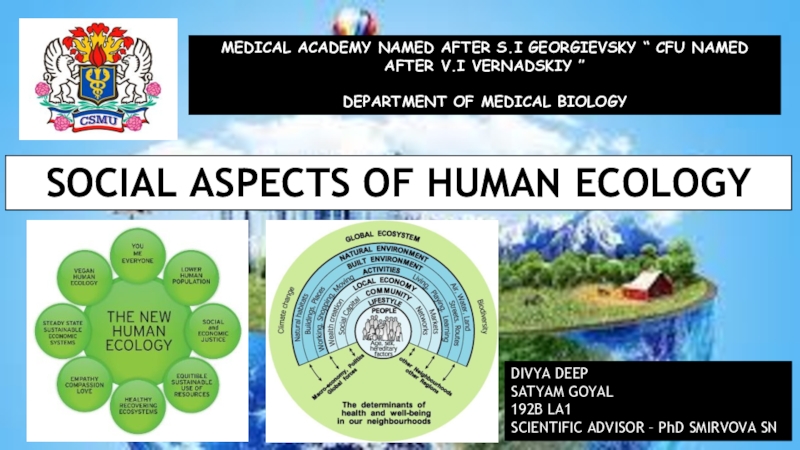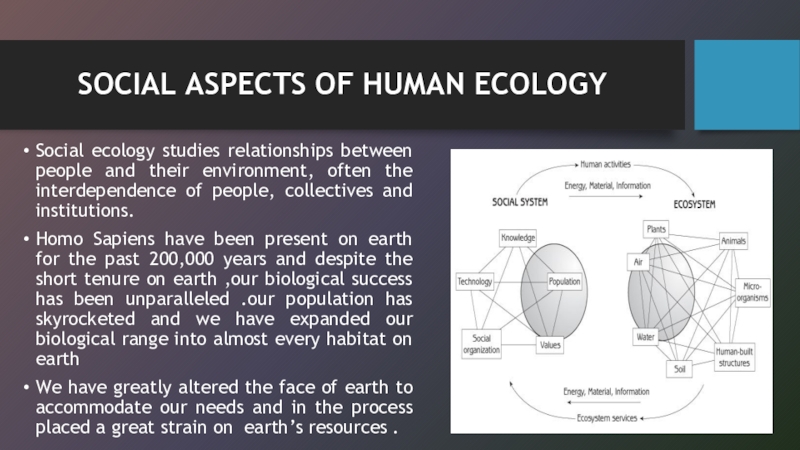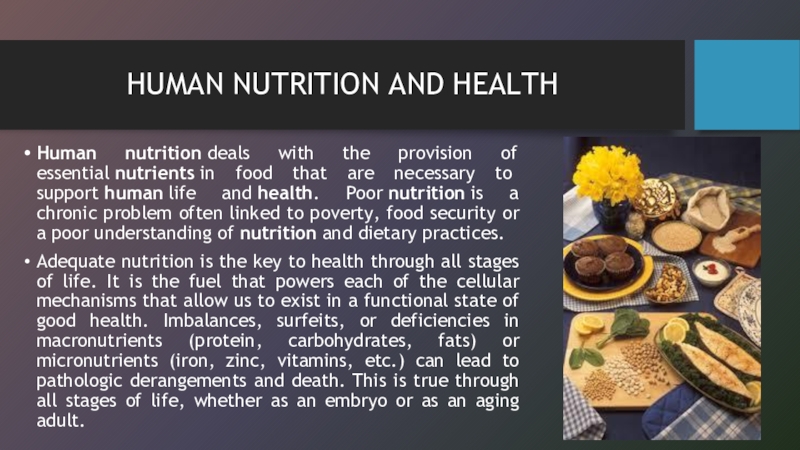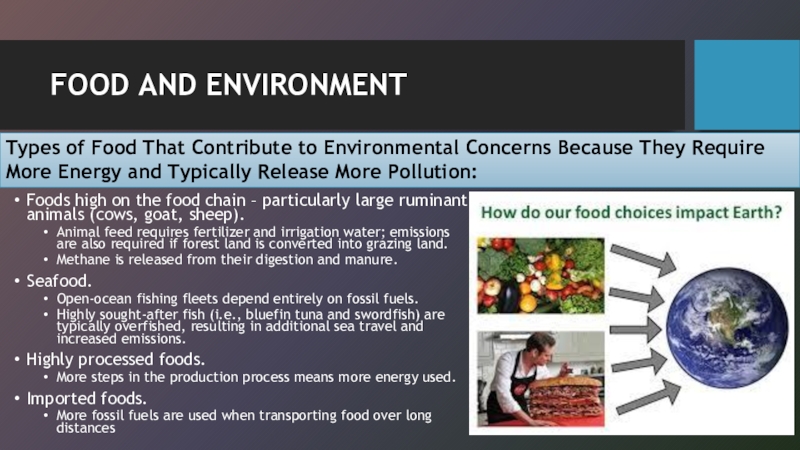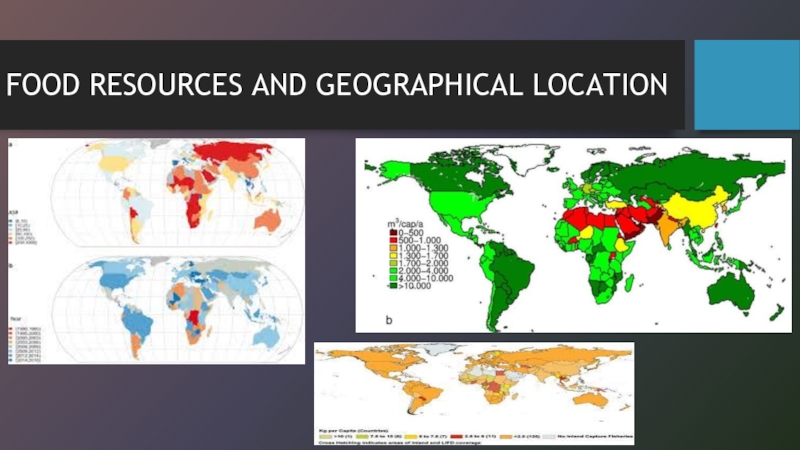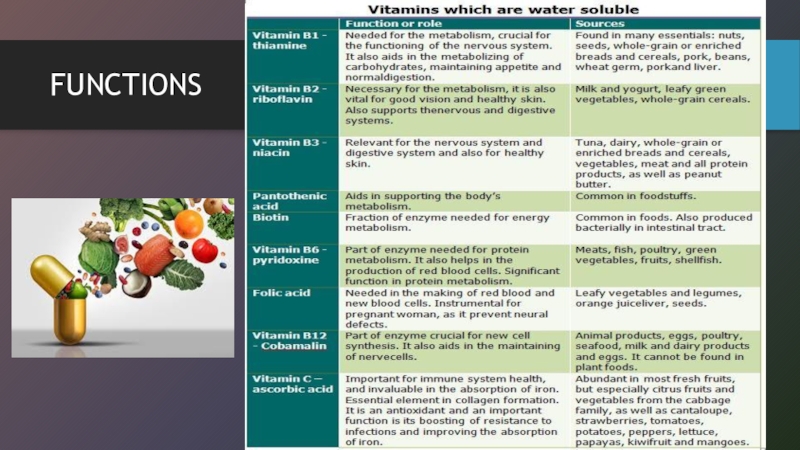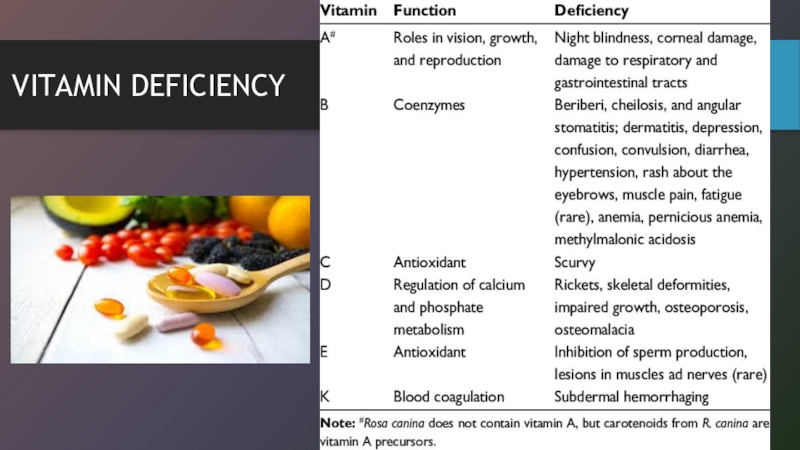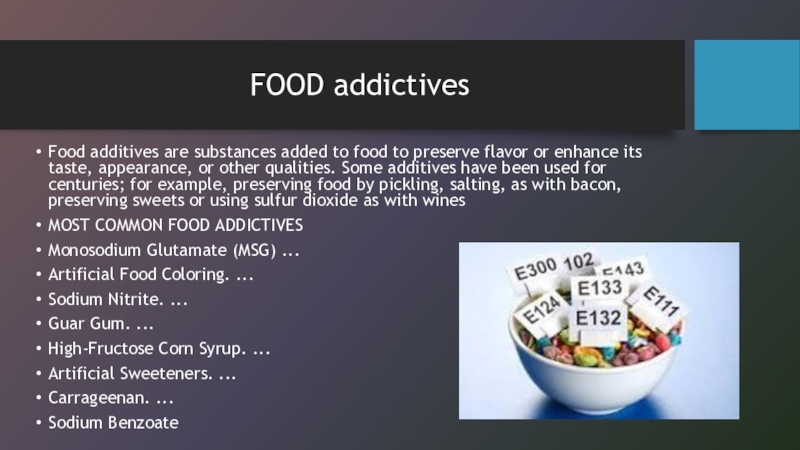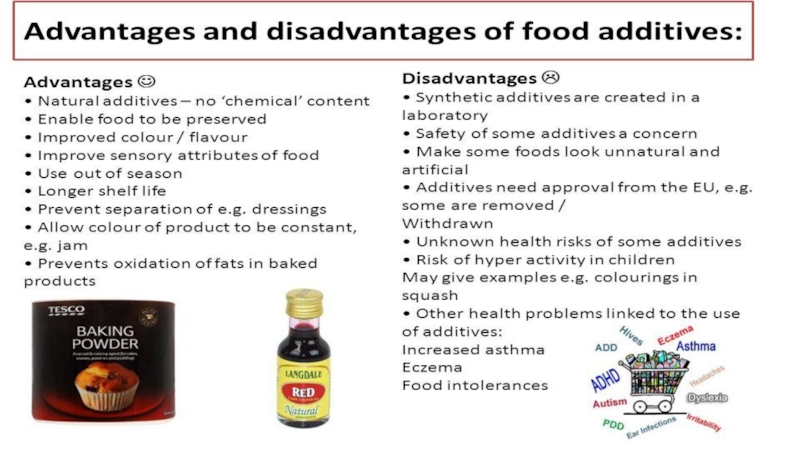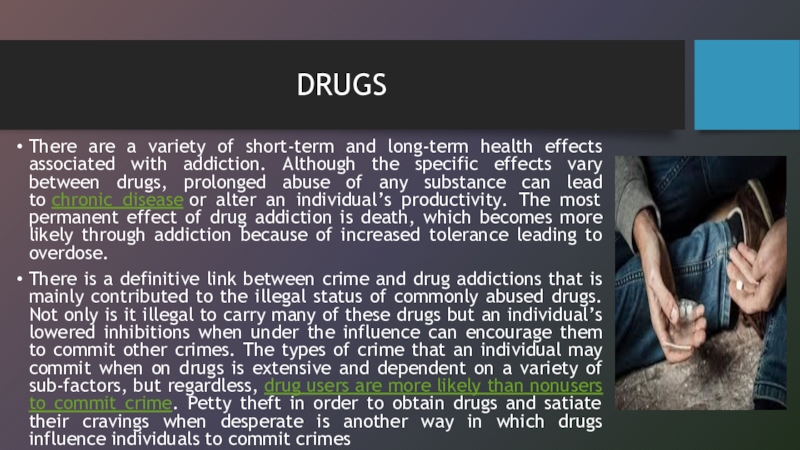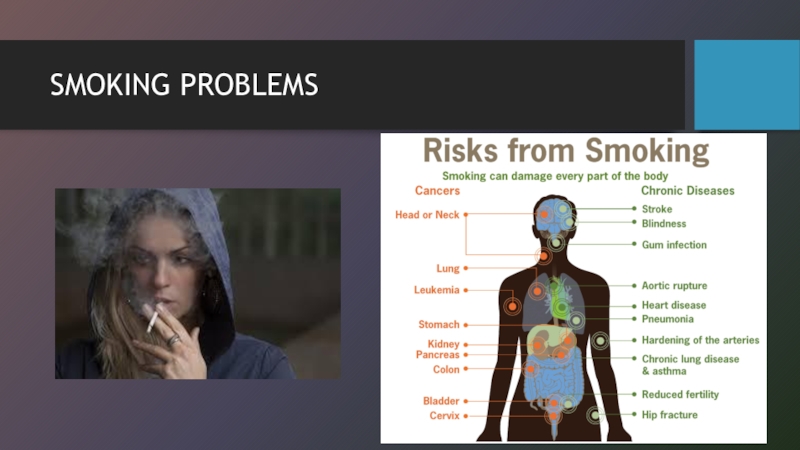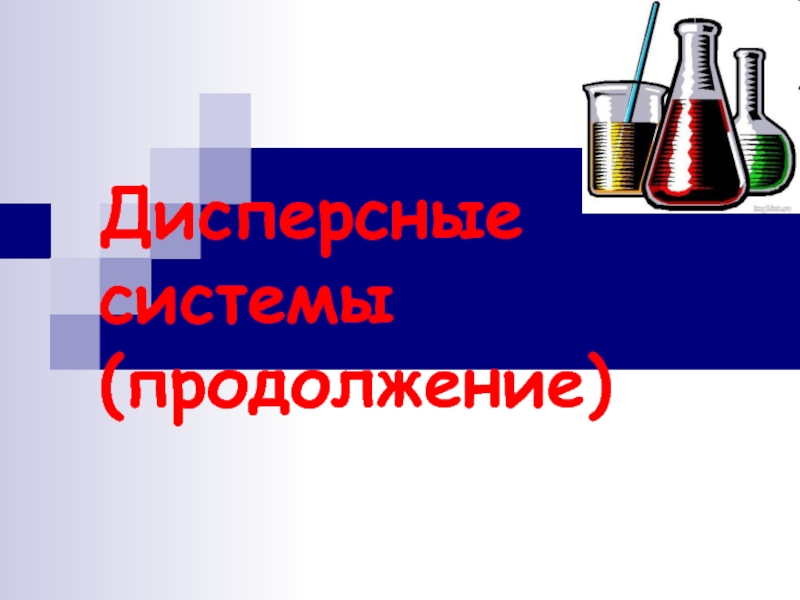Слайд 1MEDICAL ACADEMY NAMED AFTER S.I GEORGIEVSKY “ CFU NAMED AFTER
V.I VERNADSKIY ”
DEPARTMENT OF MEDICAL BIOLOGY
SOCIAL ASPECTS OF HUMAN ECOLOGY
DIVYA
DEEP
SATYAM GOYAL
192B LA1
SCIENTIFIC ADVISOR – PhD SMIRVOVA SN
Слайд 2SOCIAL ASPECTS OF HUMAN ECOLOGY
Social ecology studies relationships between people
and their environment, often the interdependence of people, collectives and
institutions.
Homo Sapiens have been present on earth for the past 200,000 years and despite the short tenure on earth ,our biological success has been unparalleled .our population has skyrocketed and we have expanded our biological range into almost every habitat on earth
We have greatly altered the face of earth to accommodate our needs and in the process placed a great strain on earth’s resources .
Слайд 3HUMAN NUTRITION AND HEALTH
Human nutrition deals with the provision of essential nutrients in
food that are necessary to support human life and health. Poor nutrition is a chronic
problem often linked to poverty, food security or a poor understanding of nutrition and dietary practices.
Adequate nutrition is the key to health through all stages of life. It is the fuel that powers each of the cellular mechanisms that allow us to exist in a functional state of good health. Imbalances, surfeits, or deficiencies in macronutrients (protein, carbohydrates, fats) or micronutrients (iron, zinc, vitamins, etc.) can lead to pathologic derangements and death. This is true through all stages of life, whether as an embryo or as an aging adult.
Слайд 4MACRONUTRIENTS
Macronutrients are needed in larger quantities (in gram range).
They normally include water, carbohydrates, fat and protein. Macronutrients (except
water) are also called energy-providing nutrients. Energy is measured in calories and is essential for the body to grow, repair and develop new tissues, conduct nerve impulses and regulate life process. Carbohydrates – are required for energy and provide body’s main source of energy (4 calories per gram); they form the major part of stored food in the body for later use of energy and exist in three form: sugar, starch and fiber.
Fats – are used in making steroids and hormones and serve as solvents for hormones and fat soluble vitamins. Fats have the highest caloric content and provide the largest amount of energy when burnt.
Proteins – they provide amino acids and make up most of the cell structure including the cell membrane. In cases of extreme starvation, the muscles in the body, that are made up of proteins, are used to provide energy. proteins also provide 4 calories per gram.
Water – makes up a large part of our body weight and is the main component of our body fluids. The body needs more water every day than any other nutrient and we replenish it through foods and liquids we eat and drink.
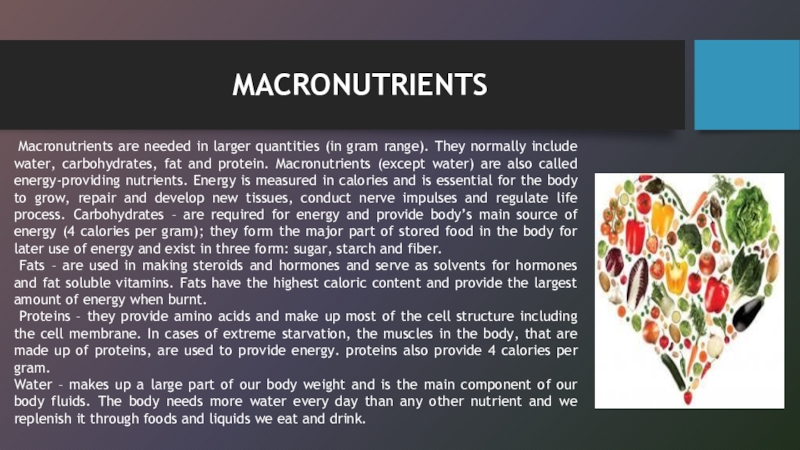
Слайд 5Micronutrients
These nutrients include minerals and vitamins. Unlike macronutrients, these
are required in very minute amounts. Together, they are extremely
important for the normal functioning of the body. Their main function is to enable the many chemical reactions to occur in the body. Micronutrients do not function for the provision of energy.
Vitamins – are essential for normal metabolism, growth and development, and regulation of cell function. They work together with enzymes and other substances that are necessary for a healthy life. Vitamins are either fatsoluble or water-soluble. Fat soluble Vitamins can be stored in the fatty tissues in the body when in excess. Water soluble vitamins are excreted in urine when in excess and so need to be taken daily. Water soluble vitamins include Vitamin B and C. Green leafy vegetables are rich in Vitamin B, whereas Vitamin C is found abundantly in citrus fruits. Fat soluble vitamins are Vitamin A, D, E and K. Green leafy vegetables, milk and dairy products and plant oils provide these vitamins.
Minerals – are found in ionized form in the body. They are further classified into macrominerals and microminerals (or trace minerals). Macrominerals present in the body include Calcium, Potassium, Iron, Sodium and Magnesium to name a few. Iron is a constituent of Hemoglobin which is present in blood. Macrominerals are needed in more amounts, as compared to microminerals. Microminerals include Copper, Zinc, Cobalt, Chromium and Fluoride. They are mostly co-factors, and are necessary for the function of enzymes in the body, but are needed only in minor quantities. Approximately 4% of the body’s mass consists of minerals.
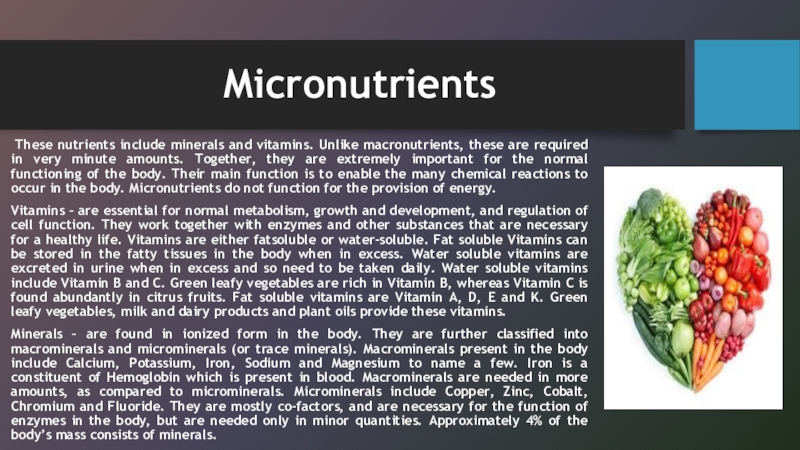
Слайд 6FOOD AND ENVIRONMENT
Foods high on the food chain –
particularly large ruminant animals (cows, goat, sheep).
Animal feed requires fertilizer
and irrigation water; emissions are also required if forest land is converted into grazing land.
Methane is released from their digestion and manure.
Seafood.
Open-ocean fishing fleets depend entirely on fossil fuels.
Highly sought-after fish (i.e., bluefin tuna and swordfish) are typically overfished, resulting in additional sea travel and increased emissions.
Highly processed foods.
More steps in the production process means more energy used.
Imported foods.
More fossil fuels are used when transporting food over long distances
Types of Food That Contribute to Environmental Concerns Because They Require More Energy and Typically Release More Pollution:
Слайд 7FOOD RESOURCES AND GEOGRAPHICAL LOCATION
Слайд 8Nutrition biotechnology
Genetic engineering provides powerful tools to enhance the modification
of plants to the potential benefit of society. However, as
with any new scientific advancement, careful consideration of the effects of employing these tools is necessary to ensure that the result will be a net benefit to society
Agricultural biotechnology may be defined as the use of living plant organisms, or parts thereof, to produce food and feed products such as insect-resistant corn, to develop processes like the manufacturing of biologics by tobacco, and to provide services such as, bioremediation of heavy metal contamination using genetically engineered poplars
During the last century plant breeders expanded the tools of genetic manipulation beyond conventional cross breeding to use a variety of other breeding techniques, including embryo rescue, chemical mutagenesis, radiation mutagenesis, and somaclonal variation
NEGATIVE EFFECTS -The concerns surrounding potential negative environmental and eco-system function outcomes of agricultural biotechnology include impacts stemming from changes in pesticide use, impacts on non-target species, and pest and virus resistance.
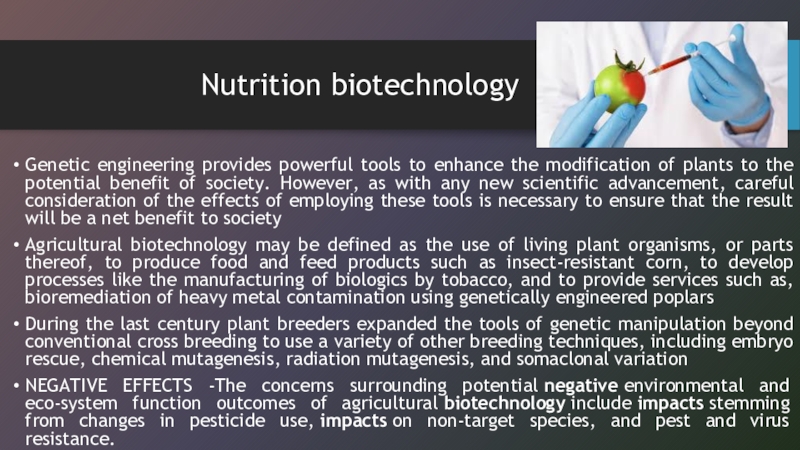
Слайд 9VITAMINS
A vitamin is an organic molecule that is an essential
micronutrient which an organism needs in small quantities for the
proper functioning of its metabolism. Essential nutrients cannot be synthesized in the organism, either at all or not in sufficient quantities, and therefore must be obtained through the diet
Vitamin C can be synthesized by some species but not by others; it is not a vitamin in the first instance but is in the second. The term vitamin does not include the three other groups of essential nutrients: minerals, essential fatty acids, and essential amino acids.Most vitamins are not single molecules, but groups of related molecules called vitamers. For example, vitamin E consists of four tocopherols and four tocotrienols. Though some sources list fourteen by including choline,major health organizations list thirteen: vitamin A (as all-trans-retinol, all-trans-retinyl-esters, as well as all-trans-beta-carotene and other provitamin A carotenoids), vitamin B1 (thiamine), vitamin B2 (riboflavin), vitamin B3 (niacin), vitamin B5 (pantothenic acid), vitamin B6 (pyridoxine), vitamin B7 (biotin), vitamin B9 (folic acid or folate), vitamin B12 (cobalamins), vitamin C (ascorbic acid), vitamin D (calciferols), vitamin E (tocopherols and tocotrienols), and vitamin K (quinones).
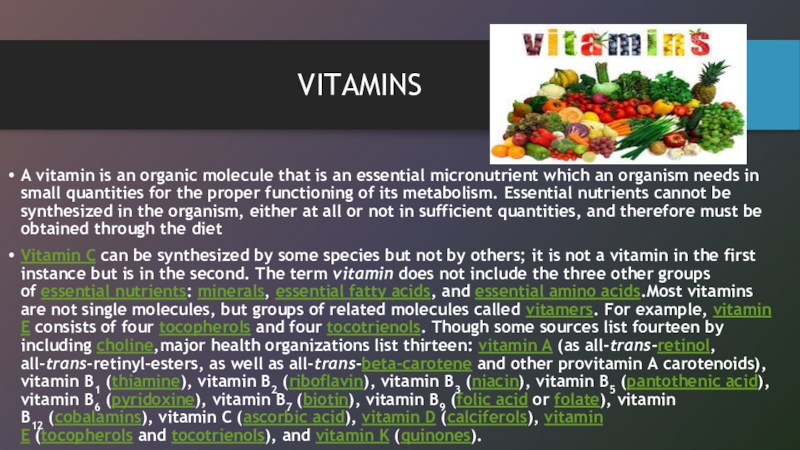
Слайд 12HYPOVITAMINOSIS
Vitamin deficiencies remain common globally. Unless severe, they are often
clinically unrecognized, yet even mild deficiency may have significant adverse
consequences. Vitamin deficiencies affect all ages and frequently co-exist with mineral (zinc, iron, iodine) deficiencies. The groups most susceptible to vitamin deficiencies are pregnant and lactating women and young children, because of their relatively high needs for these compounds and susceptibilities to their absence. These include death from infectious diseases, anemia, death during pregnancy or childbirth, and impaired cognition and physical development. The effects of vitamin deficiencies are related to the biochemical roles they play. Some of the most common deficiencies relate to vitamin A, various B vitamins, folate, and vitamin D. Supplementation programs have made diseases such as scurvy (vitamin C deficiency) or pellagra (niacin deficiency) rare. New information suggests that vitamin D deficiency, which causes osteomalacia and rickets, is associated with abnormal immunoregulation and infectious diseases.
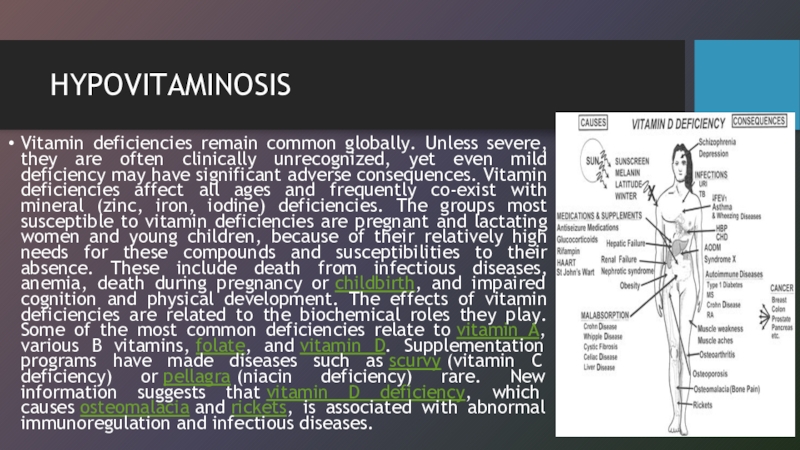
Слайд 13FOOD addictives
Food additives are substances added to food to
preserve flavor or enhance its taste, appearance, or other qualities.
Some additives have been used for centuries; for example, preserving food by pickling, salting, as with bacon, preserving sweets or using sulfur dioxide as with wines
MOST COMMON FOOD ADDICTIVES
Monosodium Glutamate (MSG) ...
Artificial Food Coloring. ...
Sodium Nitrite. ...
Guar Gum. ...
High-Fructose Corn Syrup. ...
Artificial Sweeteners. ...
Carrageenan. ...
Sodium Benzoate
Слайд 15Why Drug Addiction Is a Social Problem
A common misconception surrounding
drug addiction is that it solely affects the life of
the user. However, the idea that they aren’t hurting anyone except for themselves is an excuse that many individuals who abuse drugs use in order to justify their addiction. Drug addiction is not a one-person phenomenon, and it creates a domino effect on the lives of those around them. It is a social problem that normalizes drug use and affects individuals and their families
At first glance, a drug addiction may appear to only affect the person who is using. However, because addiction is a destructive issue that can have an adverse effect on the community, family, and individual, it’s very rare that other people aren’t affected. An individual neglecting their responsibilities as a result of drugs can negatively affect their career, children’s education, or family’s financial security. Their impact can also extend outside of the immediate family. Friends or community members who rely on their presence or companionship can suffer from their absence.
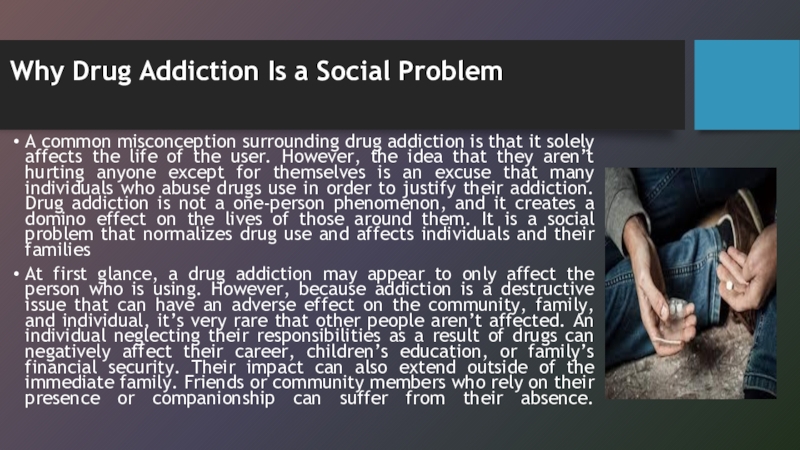
Слайд 16DRUGS
There are a variety of short-term and long-term health
effects associated with addiction. Although the specific effects vary between
drugs, prolonged abuse of any substance can lead to chronic disease or alter an individual’s productivity. The most permanent effect of drug addiction is death, which becomes more likely through addiction because of increased tolerance leading to overdose.
There is a definitive link between crime and drug addictions that is mainly contributed to the illegal status of commonly abused drugs. Not only is it illegal to carry many of these drugs but an individual’s lowered inhibitions when under the influence can encourage them to commit other crimes. The types of crime that an individual may commit when on drugs is extensive and dependent on a variety of sub-factors, but regardless, drug users are more likely than nonusers to commit crime. Petty theft in order to obtain drugs and satiate their cravings when desperate is another way in which drugs influence individuals to commit crimes
Слайд 19STOP SMOKING ,DRINKING ALCOHOL AND ABUSING DRUGS …THEY KILL YOU
AND YOUR FAMILY ALONG WITH IT
